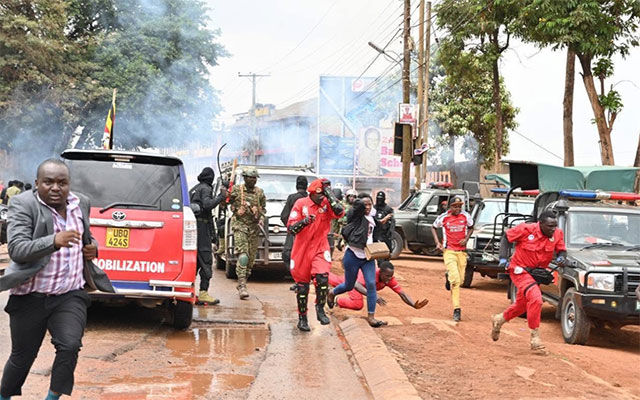Uncovering the Truth: Uganda Human Rights Commission's Response to the Kawempe North By-Election Violence
- Sunrise with Rashidah
- 4 days ago
- 3 min read
The recent by-election in Kawempe North, Uganda, has stirred a wave of concern regarding human rights and the integrity of the electoral process. Disturbing reports of violence and intimidation have drawn the attention of the Uganda Human Rights Commission (UHRC), prompting them to take a public stance against these actions. In this post, we will closely examine the context of the by-election, the UHRC's response, and the significant implications for human rights going forward.
The Context of Kawempe North By-Election
The Kawempe North by-election took place on [insert date] and was rife with claims of electoral fraud and voter intimidation. Incidents of violence were particularly alarming, with over 50 reported cases of severe assaults on voters and election monitors. This electoral event was vital for assessing Uganda's commitment to democracy, especially amidst growing concerns about human rights and governance.
In light of these events, the UHRC stepped in to advocate for the rights of citizens, emphasizing the necessity of protecting fundamental freedoms, especially during politically charged periods like elections.
Human Rights Commission’s Condemnation
In a forceful public statement, the Uganda Human Rights Commission condemned the violence that transpired during the by-election. The UHRC asserted that such acts of violence violate the basic rights of citizens and weaken the democratic foundations that should guide the electoral process.
The Commission further called for accountability, urging the government to conduct a thorough investigation into these incidents. They specifically asked security agencies to exercise restraint and respect the rights of all citizens, regardless of their political beliefs. Their prompt response signals a growing acknowledgment of the need for stronger protections for human rights within Uganda's often contentious political environment.
Eyewitness Accounts and Reports
Eyewitness reports reveal alarming details about the violence on the ground during the by-election. Many supporters of opposing candidates faced attacks, leading to injuries and fear among voters. Notably, on the Election Day alone, security forces were reported to have used tear gas and live ammunition, which is considered excessive according to international human rights norms.
For example, in one incident, at least 15 people sustained injuries from rubber bullets, while others were treated for tear gas inhalation. Such distressing accounts underline an electoral process that should nurture political expression but instead engendered chaos and anxiety. The implications of these events stretch beyond just one election; they pose lingering questions about the integrity of Uganda's electoral systems.
The Role of Civic Engagement
Civic engagement is crucial in advocating for human rights and fostering democracy. Civil society organizations, activists, and ordinary citizens must feel empowered to denounce violence and push for transparency in elections.
The Uganda Human Rights Commission emphasizes the importance of public participation in holding authorities accountable. Studies show that nations with active civil societies experience 30% fewer human rights violations. A vibrant civil society can act as a protector of human rights, helping to cultivate a culture of accountability and compliance with the rule of law.
Implications for Future Elections
The disorder witnessed during the Kawempe North by-election serves as a significant alert for future electoral processes in Uganda. Observers within the international community, local activists, and independent political analysts are closely monitoring how these violations will be resolved.
Without immediate action to address human rights abuses, there is a risk that subsequent elections may also be tainted by violence. The UHRC's strong condemnation sends a critical message that such behavior is intolerable and must face consequences. If measures to ensure fair electoral practices are not implemented, it could undermine the very essence of Uganda's political legitimacy.
A Call for Dialogue and Reform
As Uganda moves forward, fostering meaningful dialogue between government officials and opposition parties is essential. These discussions should focus on setting up frameworks that prioritize human rights and ensure protections for citizens during elections.
In addition, reforms aimed at enhancing electoral integrity and oversight should become a top priority. Implementing transparent processes and systems can significantly bolster public trust in elections, allowing citizens to feel secure and empowered in their participation.
Moving Towards a Just Society
The Uganda Human Rights Commission’s response to the violence during the Kawempe North by-election represents a pivotal opportunity for all stakeholders within Uganda’s political landscape. Upholding human rights during elections is critical to a thriving democracy.

As citizens, civil organizations, and governmental entities work collaboratively, they can pave the way toward a more just and equitable society. The events of the by-election serve as a clarion call, reminding us that the struggle for human rights is far from over. Vigilance, accountability, and proactive reform will be vital for meaningful progress in Uganda.
Comments